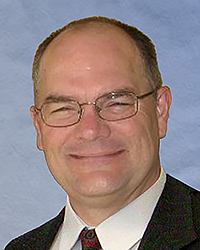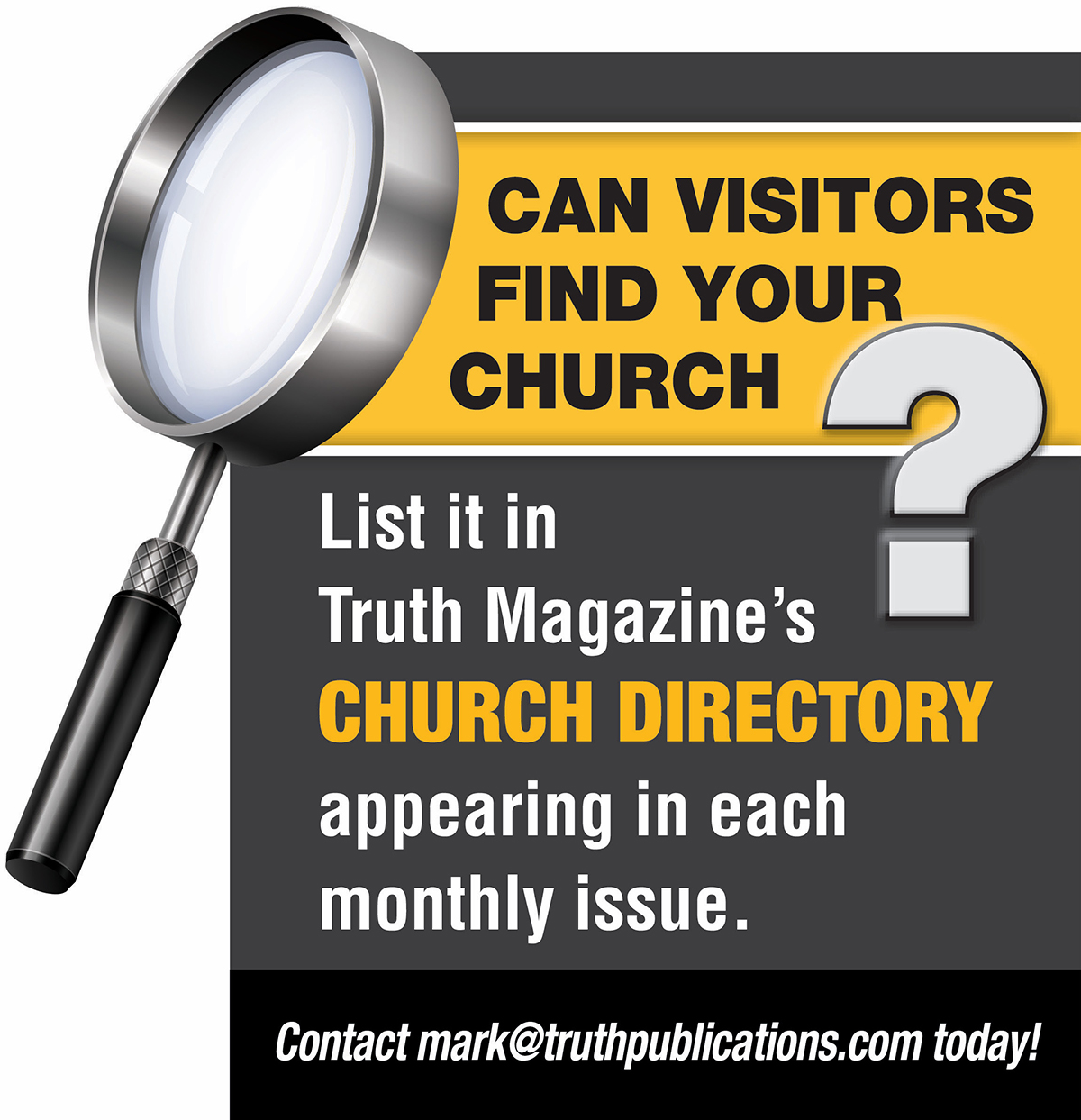

by Kyle Pope
Synopsis: While organized religious debates are no longer common as in yesteryear, they provide a valuable opportunity for each side to set forth their case and allow hearers to decide which (if either) reflect the teaching of Sacred Scripture.
Recently, the elders where I preach at Olsen Park in Amarillo, TX announced to the congregation that in July of 2020, we will host a four-night debate on the question of the AD 70 doctrine between Bruce Reeves and Holger Neubauer. As plans are beginning for this study, it is appropriate (as with all church activities) to consider whether or not the Scriptures authorize this as a work of the church. Let's consider what the Bible teaches on this question.
Before looking at the biblical evidence, we must first clarify exactly what this type of debate involves. In our day, public debates are not very common. In the political realm, we have seen debates involving candidates for office facing questions about their position on various issues. The focus is on "one-liners," stage presence, or which candidate comes off better on camera. That is not the kind of debate we're talking about. In school, as an element of many speech classes, students are taught how to engage in formal debate. They learn how to argue both sides of an issue, and may be encouraged to join debate clubs and competitions. While some aspects of this type of debate might be utilized in a religious discussion, the kind of debate under consideration is not competitive, but informative.
In religion, debates are seldom conducted anymore, but historically they have played an important role in striving to ascertain the truth on different scriptural questions. Essentially, two parties with differing views publicly lay out their case for the conclusions they have drawn considering the evidence supporting each position. Much like a public Bible class, opportunity is given to each to voice his convictions, and to answer one's counterpart's concerns within prescribed rules intended to keep things orderly and controlled.
Within the Restoration Movement, debates served a crucial role in allowing opportunities for brethren to consider in detail whether different issues were scriptural. As those striving to—"Test all things; hold fast what is good" (1 Thess. 5:21)—debates were considered a reasonable and honorable way to accomplish this. The assertion was often affirmed—"The truth can hold up to testing."
For better or worse, religious debates are largely a thing of the past. This may be because of the way some were handled. Instead of respectful discussions aimed at reaching a better understanding of the word of God, some degenerated into spiteful, mean-spirited, personal attacks that neither informed anyone nor glorified God. Perhaps we no longer see many debates because our politically correct, Post-Modern world (that argues, "nothing is wrong, except saying something is wrong") despises any claim that there is such a thing as right and wrong, or truth and error. Whatever the reasons, if something is authorized by Scripture we must not allow the world's views or mistakes of the past to keep us from seeking and standing up for truth in ways that are honorable and scriptural.
In his first epistle to Timothy, Paul described the church as the "pillar and ground of the truth" (1 Tim. 3:15). That tells us something about its work. It is to uphold "truth" just as a pillar holds up the roof that spreads over it. How is that to be done? Notice what is said regarding two workers within the church.
1. Evangelists. Preachers are charged to "exhort, and rebuke with all authority" (Titus 2:15). As they "preach the word," they are to "correct, rebuke and encourage—with great patience and careful instruction" (2 Tim. 4:2, NIV). Often this is private, but sometimes it requires publicly addressing truth and error. Timothy was told, "Those who are sinning rebuke in the presence of all, that the rest also may fear" (1 Tim. 5:20, NKJV). In his second letter to Timothy, Paul wrote:
. . . a servant of the Lord must not quarrel but be gentle to all, able to teach, patient, in humility correcting those who are in opposition, if God perhaps will grant them repentance, so that they may know the truth, and that they may come to their senses and escape the snare of the devil, having been taken captive by him to do his will (2 Tim. 2:24-26).
Let's notice some points from this text. First, the preacher is not to "quarrel," but he is to correct "those who are in opposition." We are reminded of Jude's charge to "contend earnestly for the faith" (Jude 3) and Paul's charge to Titus to "fight the good fight" (1 Tim. 6:12), using spiritual weapons to cast "down arguments and every high thing that exalts itself against the knowledge of God" (2 Tim. 10:5). How does one fight and contend without quarreling? By doing so "in humility" with a spirit that is "gentle to all," striving (not to win an argument, but) to lead all to "know the truth."
Secondly, notice that this involves "correcting those who are in opposition" (2 Tim. 2:25). Let's think about that charge. A preacher may offer a lesson about some false doctrine that exists in the world at large, but how does that correct those who hold this belief? "Those who are in opposition" can only be corrected if, (1) some opportunity to learn and openly express an opposing belief exists, and (2) some opportunity to discuss and try to correct this opposing belief exists. That is what is involved in any public religious discussion, whether in a Bible class or in a religious debate.
2. Elders. Paul's instructions regarding elders also address our question. He commanded Titus, "for there are many insubordinate, both idle talkers and deceivers, especially those of the circumcision, whose mouths must be stopped, who subvert whole households, teaching things which they ought not, for the sake of dishonest gain" (Titus 1:10-11). These words come immediately after discussing the work of elders (Titus 1:7-9). Clearly, there must be some venue in which elders can discover the claims of these "idle talkers" and thereby stop their mouths. This might be done privately, but often the public nature of the idle talk dictates the public nature of the stopping of the mouths of these talkers.
In the list of qualifications, it ends with a statement regarding their work. The bishop serves, "holding fast the faithful word as he has been taught, that he may be able, by sound doctrine, both to exhort and convict those who contradict" (Titus 1:9). How can elders hold fast the word without it being voiced publicly? This is to be done to "those who contradict." This very charge infers some degree of allowance for the open expression of religious views. Elders cannot "exhort and convict" that which has never been publicly expressed. So, the clear inference is that there is some type of open expression of the elders' "faithful word" and the claims of "those who contradict."
We can see from these instructions, given to both preachers and elders, that the church as the "pillar and ground of the truth" is charged to stand up for the sound teaching of God's word both publicly and privately. This must involve not only abstract discussions of error in general, but practical open discussions of questions that personally affect a local congregation.
The New Testament records many examples of different types of religious discussions in the early church. Let's consider three examples in which we see the church involved in various types of discussion (or debate) over specific questions. Please note especially the participants and focus (or we could say "debate propositions") of each discussion.
1. Peter and Those of the Circumcision—Conversion of Gentiles. After the conversion of Cornelius, upon Peter's return to Jerusalem, "those of the circumcision contended with him" (Acts 11:2). This involved some type of public questioning of Peter's actions (Acts 11:3), followed by a public recounting of the conversion of Cornelius (Acts 11:4-17). As a result, those who opposed him "became silent" and "glorified God," expressing publicly, "Then God has also granted to the Gentiles repentance to life" (Acts 11:18). In other words, this was an approved public discussion involving differing religious views.
2. Paul and Barnabas and Believing Pharisees—Circumcision of Gentiles. Following Paul's first preaching journey, the question of Gentile circumcision arose. Paul and Barnabas were working with the church in Antioch when this issue became contentious (Acts 14:26—15:2). The church sent them to Jerusalem to consider the issue (Acts 15:3). We have often stressed that this situation does not authorize "church councils" (as later practiced after the New Testament) because what made this unique was the presence of the apostles. Today, we have no living apostles; rather, we have their teaching as preserved in the New Testament. However, let's note some things. When Paul and Barnabas went to Jerusalem they first "were received by the church and the apostles and the elders; and they reported all things that God had done with them" (Acts 15:4). So in this, we have preachers from another congregation reporting their actions and convictions publicly to another congregation. While in Jerusalem (and perhaps during the same assembly) we are told that some believing Pharisees declared, "It is necessary to circumcise them, and to command them to keep the law of Moses" (Acts 15:5). This led to the meeting of the apostles and elders (Acts 15:6-21), and ultimately the letter sent to Gentile Christians (Acts 15:22-29), but it was preceded by the public exchange between Paul and Barnabas and the believing Pharisees. It was followed by a public discussion of the issue in the church in Jerusalem (Acts 15:22) and the church in Antioch (Acts 15:30-32). That is essentially what happens in modern religious debates.
3. Paul and Peter (and James)—Eating with Gentiles. On a separate occasion, Paul records an incident when Peter came to Antioch, and (as a result of the influence of James), began to withdraw himself from social contact with Gentiles (Gal. 2:11-12). This incident is pertinent to our study for several reasons. First, we see the example of brethren from other places teaching Christians in other congregations. In this instance, the teaching of James was in error, but the principle of Christians teaching other Christians underlies the whole situation. Second, we see Paul's response. He describes having "withstood him to his face" (Gal. 2:11) as he reasoned with "Peter before them all" (Gal. 2:14a). While we are not given the content of the teaching of James, Paul, in essence, summarizes his debate notes and the focus of his proposition (Gal. 2:14b-21). So we have Paul in a public discussion setting forth his case, in response to the case previously set forth by James and adopted by Peter. That is a debate.
In each of these examples, we see public discussions of different questions. In each example, while error is rebuked, the forum of the public discussion of these issues is set forth as an approved method of teaching truth and exposing error. This is no different from the approach that is taken in modern religious debates.
So what does this tell us about our question of whether the church is authorized to host a debate? We have seen the biblical charge given to the church and its preachers and elders to stand up for, and patiently uphold, truth in the face of "those who contradict" (Titus 1:9). We have seen approved examples in which this was done before the congregation in a manner that allows both sides of a question to be addressed. This indicates that the church does have generic authority to engage in religious discussions for the goal of determining and upholding scriptural teaching on various questions. Given the fact that no specific procedure for this is outlined in the New Testament, the manner in which such discussions are conducted is a matter of expediency—so long as they are handled "decently and in order" (1 Cor. 14:40). I am confident that all of those involved in the planning, preparation, and participation in next year's scheduled debate at Olsen Park have only these clear and scriptural goals as their objectives. It is my prayer and confidence that this effort will glorify God and help all involved to grow in love for Him and His word.
Author-Bio: Kyle preaches for the Olsen Park Church of Christ in Amarillo, TX. He has written several books published by Truth Publications including How We Got the Bible. The church website is olsenpark.com. He can be reached at kmpope@att.net.

